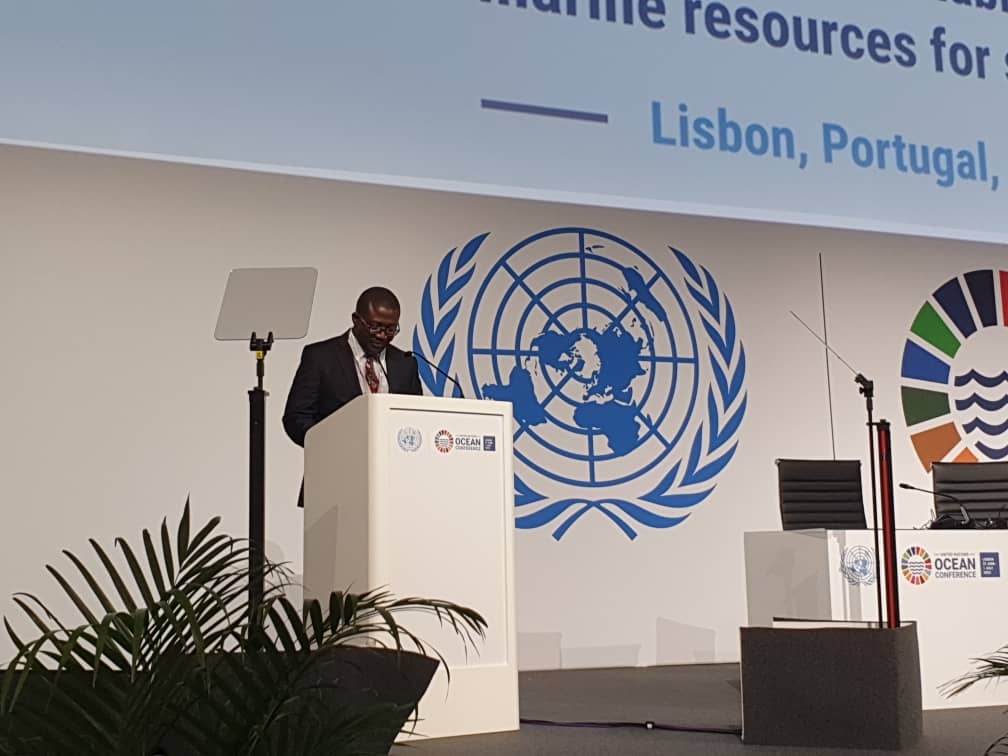|
Getting your Trinity Audio player ready...
|
The Minister of Environment, Climate, Tourism, and Hospitality Industry for Zimbabwe, Hon Nqobizitha Mangaliso Ndhlovu has called on the international community to deliberate on ways to address the multiple challenges facing oceans, seas, and marine resources, in order to reinvigorate global efforts to rescue our Oceans, in this Decade of Action for Sustainable Development.
He made the remarks in Lisbon, Portugal where he is representing The President of the Republic of Zimbabwe His Excellency Cde Dr. E.D. Mnangagwa at the ongoing United Nations Ocean Conference 2022.
“I commend the governments of Portugal and Kenya, for co-hosting this important Conference, which is an opportunity to deliberate on how, collectively, we can confront the multiple challenges facing our Oceans, seas, and marine resources, in order to reinvigorate global efforts to rescue our Oceans, in this Decade of Action for Sustainable Development.
“The Ocean has an impact on an estimated US$500 billion global economy and the livelihoods of at least 1 out of every 10 people in the world. Pollution, overfishing, and the effects of climate change are severely damaging the health of the ocean. According to recent studies, plastic could outweigh fish in our seas by 2050, if targeted interventions are not deployed,” Hon Ndhlovu said.
The overall theme of the Conference is, “Scaling up ocean action based on science and innovation for the implementation of Goal 14: stocktaking, partnerships, and solutions.”
He said Zimbabwe, though landlocked, is very much part of this discourse on the health of the Ocean, and is equally concerned as the Ocean provides all of us with vital services and products, and must be managed sustainably, for future generations. If the ocean fails, it is because we would have failed to assume our collective responsibility.
In pursuit of the objectives of the ambitious 2030 Agenda for Sustainable Development, and its cardinal belief of leaving no one behind, Zimbabwe continues to implement policies and regulatory mechanisms, geared at accelerating the achievement of all the 17 SDGs, with equal emphasis being placed on SDG 14, the one stakeholders are gathered in Lisbon to review.
The United Nations Convention on the Law of the Sea (UNCLOS), clearly gives landlocked States the right to access the oceans, as well as the right to participate, on an equitable basis, in the exploitation of the surplus from the living resources.
“We, however, remain saddened that the participation of landlocked developing countries (LLDCs) in the ocean economy remains marginal, partly due to poorly developed transit and transport systems, limited resources, lack of awareness, as well as limited access to the sea. It is imperative that the participation of Landlocked Developing Countries in ocean-based economies is enhanced as a matter of urgency,” MinisterNdhlovu added.
The United Nations Ocean Conference is not a just a solidarity for SDG 14, but has important matters to be discussed that are:
• Planet biodiversity
• Water cycle and climate change
• Pollution and waste management
• Food and nutrition security
• Maritime transportation and trade (and economic co-operation)
• Legal and institutional issues
• Science and innovation
• Global pandemics and world recession.
Oceans are important for the Zimbabwe economy as Zimbabwe imports and exports goods by sea, and therefore it is served by global goods that form an important part of the economy.
The UN Oceans summit has a lot of side events and Zimbabwe seeks to maximize the time to engage. There are key strategic issues to be discussed in those strategic meetings, and these are:
1. Tourism – building tourism after Covid19 pandemics and threats from the same in the tourism and travel industry.
2. Climate change – is a threat to global biospheres, and has an effect directly on non-landlocked countries. Having a common position on issues of mitigation, adaptation, loss and damage, scientific assessments, and commonly agreed rules is vital with ocean and non-ocean states,
3. Biodiversity threats – to include endangered flora and fauna species and the role that Zimbabwe has played in promoting a conservation approach that has led to species recovery and growth and seeking to trade some species as a management mechanism that applies to oceans,
4. Pollution – at all levels and across the transportation servitudes of goods and that includes the oceans. Zimbabwe desires non-pollution and spillages off the goods that it receives,
5. International legal and institutional matters – global cooperation is fundamental to maritime ocean management given that human activities have wider impacts beyond national boundaries,
6. Science and innovation – Zimbabwe is launching its own satellite into orbit to generate its own data for strategic national planning. This comes from years of struggling to get data for planning, and that also includes the riverine resources strategic to national planning. Through the UN oceans, the Ministry of Environment, Climate, Tourism, and Hospitality Industry would like to identify how science can be advanced, as the country has the Kariba Research Station under the University of Zimbabwe that provided foundations for science on fisheries, water, and rivers terrestrial ecosystems research.






